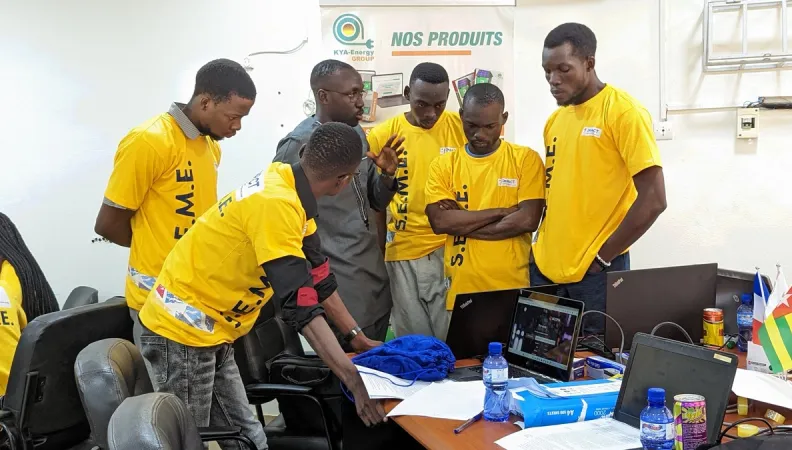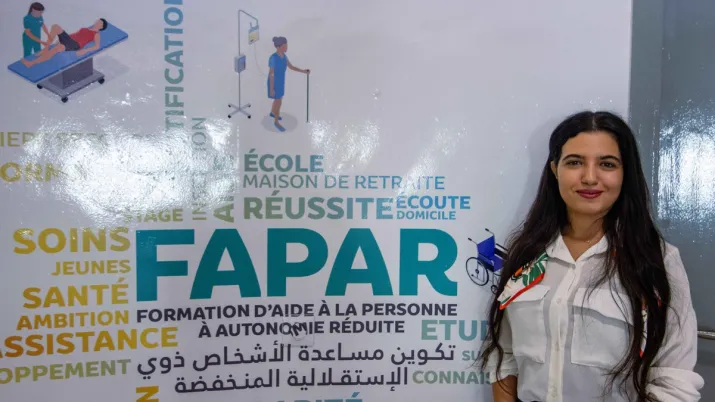Share the page
University of Lomé: Investing in entrepreneurship and innovation
Published on

The IMPACT project, a winner of the Academia Partnerships Africa - France program (PeA), is supporting the development of the Lomé Polytechnic School in Togo. Professor Edem K. Koledzi, director of the University of Lomé’s Innovation and Technology Hub (UniPod Togo), tells us more about the curriculum designed to train the next generation of engineers and researchers.
The IMPACT project, a winner of the Academia Partnerships Africa - France program (Partenariats Académiques Afrique–France, PeA), is supporting the development of the École polytechnique de Lomé in Togo. Led by the University of Lomé and the University of Technology of Troyes, with support from the University of Technology of Belfort–Montbéliard (UTBM) and IMT Mines Albi, the project is rolling out a professional academic program from the undergraduate to the doctoral level. The focus: applied mathematics in logistics, computer science, artificial intelligence, and big data.
The goal is to train a new generation of engineers and researchers equipped to meet the needs of Togo’s economy and contribute to the growth of a rapidly expanding services sector. To achieve this, IMPACT places strong emphasis on student entrepreneurship and innovation. This approach is explored in the following interview with Professor Edem K. Koledzi, director of the University of Lomé’s Innovation and Technology Hub (UniPod) and a member of the IMPACT team.
Why are entrepreneurship and innovation key priorities for Togo today?
Togo recorded growth of 5.7% in 2021–2022, driven by the government’s 2020–2025 roadmap for building a more inclusive and sustainable economy. One of the country’s main challenges is diversifying an economy still heavily reliant on agriculture and the informal sector, which together account for 23% of GDP and 60% of employment. At the same time, Togo is working to position itself as a regional economic hub. These dynamics open the door to significant opportunities for entrepreneurship.
Yet students often aim for salaried positions, leaving much of the entrepreneurial landscape to those without formal qualifications. IMPACT seeks to change this by placing entrepreneurship and business creation on equal footing with traditional employment. By integrating entrepreneurship into academic training, the project promotes the formal economy as a pathway to inclusion and long-term sustainability, both for young people and for the country as a whole.
What are the flagship actions supporting student entrepreneurship at the University of Lomé?
With support from the United Nations Development Programme (UNDP), the IMPACT project, and the World Bank, the University of Lomé has established UniPod Togo, an innovation and technology hub structured into three divisions. The first brings together ten state-of-the-art laboratories. The second, a technology transfer and industrial liaison office, guides projects through to market launch. The third, focused on incubation and entrepreneurship, hosts project leaders and offers training programs, including a university diploma (DU) in entrepreneurship.
This DU was designed by IMPACT based on the European EntreComp framework for entrepreneurial skills and adapted to the Togolese context. It is taught entirely by professionals from the private sector (CEOs, HR managers, legal experts and sales executives) who guide students from the initial idea to a complete business plan. Their involvement gives students direct exposure to the norms and realities of the business world and helps accelerate their professional development. In parallel, IMPACT has introduced a student–entrepreneur status, which will be implemented with the next cohort. This status will allow students to pursue their business projects within a university structure adapted to their dual activity.
What kinds of projects are the student–entrepreneurs currently developing?
Previous cohorts have developed a wide range of initiatives, from disease detection in agriculture to digital solutions for shopping centers and the production of eco-friendly charcoal. One standout project from the 2025–2026 cohort focuses on an automated irrigation system, a crucial innovation in a climate change context where water management is becoming increasingly strategic. UniPod is also supporting the development of a manually operated plastic recycling injection machine to produce everyday items. These initiatives reflect the potential of student–entrepreneurs to address local challenges with innovative, sustainable solutions for Togo.
More broadly, IMPACT is working to strengthen ties between academia and industry. How are you helping students connect with businesses and enter the workforce?
IMPACT has reshaped the teaching model at the University of Lomé, especially within the Polytechnic School. This includes mandatory internships, instruction by professionals, real-world case studies and discussions on introducing apprenticeships into engineering programs. Additional initiatives reinforce this practical approach. For example, during the Math–Enterprise Study Week (Semaine d’Étude Maths–Entreprises, SEME), PhD students spend a week developing technical solutions for companies. Another example is Crunch Time, a hackathon organized in partnership with businesses.



